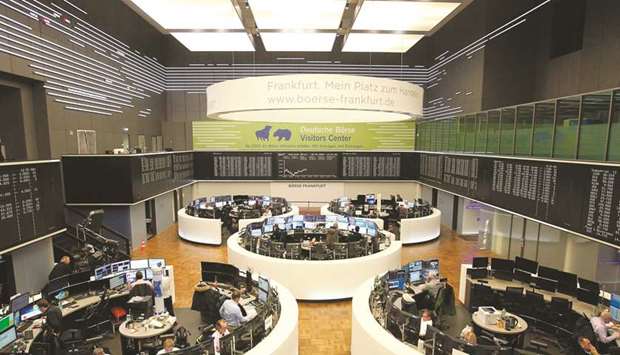Global stocks slumped again yesterday to mark the largest weekly drop since the 2008 global financial crisis over fears the coronavirus could wreak havoc on the world economy.
Crude oil prices tumbled as well and analysts said that central banks, especially the US Federal Reserve, might have to shift into crisis-resolution mode with urgent interest rate cuts.
But James Bullard, head of the Saint Louis Fed, warned that emergency rate cuts were “not the baseline at this time” for the central bank’s policymakers.
And “beyond helping to alleviate the current stock market collapse, there is little any central bank could do to alleviate the potential repercussions of a global pandemic,” noted Joshua Mahony, senior market analyst at IG.
Frankfurt headed the losses in Europe, shedding almost 3.9% to 11,890.35 as the market closed.
Leading European stock markets have lost more than 10% in just one week, with London’s FTSE 100, which fell by 3.4% to 6,565.80 points yesterday, giving up 11.3% and Paris’s CAC 40 was down 3.4% to 5,309.90 points at close yesterday.
But in New York, the Dow Jones index was 1.1% lower in midday trades, while the broader S&P 500 was off by 0.7%, coming back from steeper drops at the open.
On Thursday, the Dow suffered its biggest points loss on record, shedding almost 1,200 points as its 4.4% drop marked the steepest decline in two years.
The markets in Shanghai, Sydney and Tokyo all closed down 3% yesterday, while Jakarta shed more than 4%.
The VIX “fear” index – which measures market volatility – is now at its highest level since the European debt crisis erupted in 2011.
“The panic mode is full on,” said Ipek Ozkardeskaya, senior analyst at Swissquote Bank.
“The coronavirus outbreak has certainly hit businesses, and it might have a longer-than-expected negative impact on company earnings and global growth,” she added.
Meanwhile, the Japanese yen continue to benefit from its status as a haven investment in times of economic uncertainty, making solid gains against the dollar.
Yields on 10-year US Treasuries were at an all-time low around 1.17%.
Concern that global crude demand will crash meanwhile sent oil prices down again, by 3.1% for Brent crude in London and by 4.6% for US benchmark WTI crude, though they too appeared to be staging a late rally, of sorts.
“Another day, another sell-off,” remarked analyst Stephen Brennock at energy consultancy PVM Associates.
“Risk assets took a significant step lower... as market players continued to squirm with unease over the growing coronavirus crisis.”
In addition to central banks, governments also faced pressure to provide support.
French Economy and Finance Minister Bruno Le Maire said the virus would be considered “a case of force majeure for companies,” meaning they would not be penalised if they failed to meet deadlines on public contracts.
The virus has now proliferated worldwide, emerging in every continent except Antarctica, and prompting governments and businesses to curb travel and public gatherings.
The Geneva International Motor Show was the latest major event to be cancelled after Switzerland banned large gatherings.
The virus has killed more than 2,800 people and infected more than 83,800 since late December.
Yesterday, Nigeria reported the first new coronavirus case in sub-Saharan Africa, as the World Health Organisation warned against the “fatal mistake” of complacency.
Meanwhile, the British pound fell sharply yesterday, losing nearly 1% against the euro and the dollar as worries about the fast-spreading coronavirus sent investors out of currencies deemed riskier.
As investors rushed for the safe-haven Japanese yen, Swiss franc and US dollar, sterling fell to its lowest against the dollar since October. Other currencies closely linked to risk sentiment also tumbled – the Australian dollar fell 2%.
Analysts said that while there was no sterling-specific news yesterday, Britain’s finances had left it vulnerable – its large current account deficit means the country depends on overseas investment.
Investors are also fretting about Britain’s negotiations with the European Union over a trade deal and whether a UK budget next month will include much more spending, which many investors say is necessary to boost economic growth.
“Sterling is acting as the wild card in a coronavirus-dominated market, mostly reliant on investors’ mood when it comes to fiscal stimulus expectations ahead of the UK budget and UK-EU trade negotiations,” ING strategists said in a note to clients.
“Next week these two drivers will remain predominant, as the calendar offers very little in terms of market-moving data releases.”
Sterling skidded to as low as $1.2753, a fresh 2020 low and its lowest level since October 2019, in late London trading before recovering to $1.2775, down 0.8% on the day.
Versus the euro the pound dropped 0.9% to as low as 86.22 pence. That was the weakest level for sterling since November and means the pound has erased all of its gains made in the run-up to the British general election in December.

Traders work in front of a board displaying the chart of Germany’s share index DAX at the Frankfurt Stock Exchange. The DAX 30 slumped 3.9% to 11,890.35 points yesterday over fears the coronavirus could wreak havoc on the world economy.


